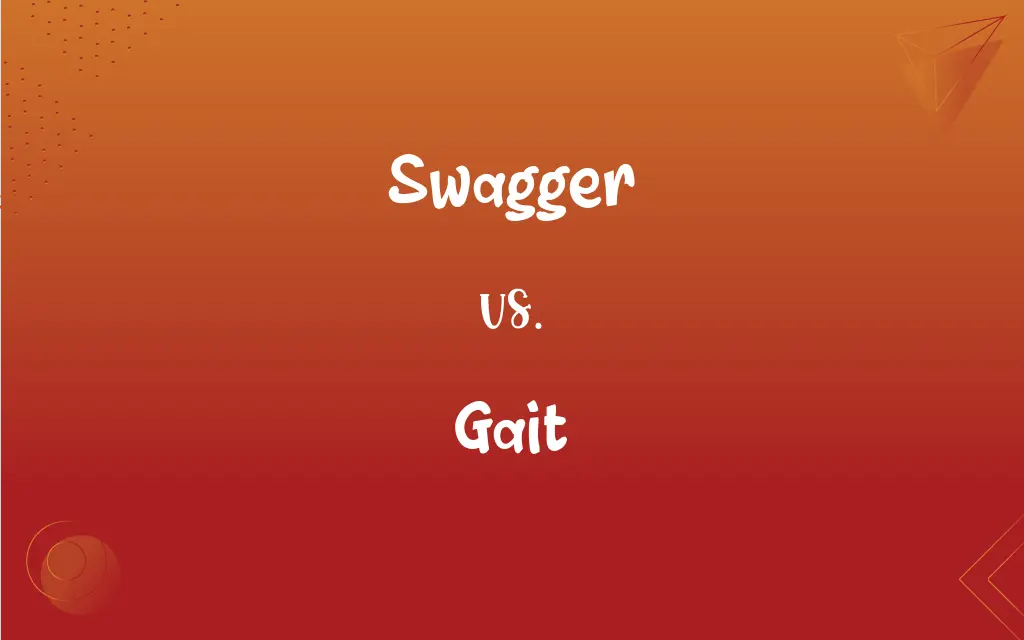Swagger vs. Gait: What's the Difference?
By Harlon Moss & Aimie Carlson || Updated on May 23, 2024
Swagger refers to a confident, arrogant walk, often with exaggerated movements, while gait describes the manner or style of walking in general, regardless of confidence or arrogance.

Key Differences
Swagger is a term that conveys a sense of confidence or arrogance in one's walk. It often implies a person is overly sure of themselves, with exaggerated movements to display their self-assurance. This term is commonly used to describe someone who wants to be noticed. Gait, on the other hand, refers to the general manner or style of walking. It is a broader term that encompasses any type of walk, from a slow, leisurely stroll to a brisk, purposeful stride. Unlike swagger, gait does not carry any connotations of confidence or arrogance.
Swagger is often associated with a showy or flamboyant attitude. People who swagger are typically seen as trying to impress or intimidate others. Their walk is marked by bold and dramatic movements. In contrast, gait is more neutral and descriptive, focusing solely on the mechanics and style of walking without any implied attitude.
While swagger suggests a deliberate attempt to project a certain image, gait is a natural characteristic of an individual's walk. It can be influenced by various factors such as physical condition, mood, and personality but does not inherently aim to communicate confidence or superiority.
Swagger can sometimes be perceived negatively, as it might come across as pretentious or boastful. Those who swagger are often viewed as seeking attention. Conversely, gait is an objective observation and is used in various contexts, including medical assessments and descriptions of animal locomotion.
Comparison Chart
Definition
Confident, arrogant walk
Manner or style of walking
ADVERTISEMENT
Connotation
Implies arrogance or confidence
Neutral
Usage Context
Describing someone's attitude
Describing walking mechanics
Perception
Often negative or showy
Objective and descriptive
Influence
Affected by desire to impress
Affected by physical and mental factors
Swagger and Gait Definitions
Swagger
Display of arrogance in movement.
The celebrity's swagger was evident as he greeted his fans.
ADVERTISEMENT
Gait
A person's specific way of moving on foot.
Her gait was smooth and graceful.
Swagger
A walk meant to attract attention.
His swagger caught the eyes of everyone in the hallway.
Gait
The natural pattern of walking.
Observing his gait, you could tell he was an athlete.
Swagger
A showy or flamboyant way of walking.
The model's swagger on the runway turned heads.
Gait
The speed and rhythm of walking.
His quick gait indicated he was in a hurry.
Swagger
An air of superiority in one's walk.
Her swagger made it clear she was in charge.
Gait
The manner or style of walking.
The doctor's analysis focused on the patient's gait.
Swagger
A confident and arrogant walk.
He walked into the room with a noticeable swagger.
Gait
A particular way or manner of moving on foot
A person who ran with a clumsy, hobbling gait.
Swagger
To walk or conduct oneself with an insolent or arrogant air.
Gait
Any of the ways, such as a canter, trot, or walk, by which a horse can move by lifting the feet in different order or rhythm.
Swagger
To brag; boast.
Gait
Rate or manner of proceeding
The project went forward at a steady gait.
Swagger
A swaggering manner of moving or behaving.
Gait
To train (a horse) in a particular gait or gaits.
Swagger
To behave (especially to walk or carry oneself) in a pompous, superior manner.
Gait
Manner of walking or stepping; bearing or carriage while moving on legs.
Carrying a heavy suitcase, he had a lopsided gait.
Swagger
To boast or brag noisily; to bluster; to bully.
Gait
(horses) One of the different ways in which a horse can move, either naturally or as a result of training.
Swagger
To walk with a swaying motion.
Gait
To teach a specific gait to a horse.
Swagger
Confidence, pride.
Gait
A going; a walk; a march; a way.
Good gentleman, go your gait, and let poor folks pass.
Swagger
A bold or arrogant strut.
Gait
Manner of walking or stepping; bearing or carriage while moving.
'T is Cinna; I do know him by his gait.
Swagger
A prideful boasting or bragging.
Gait
The rate of moving (especially walking or running)
Swagger
Fashionable; trendy.
Gait
A horse's manner of moving
Swagger
To walk with a swaying motion; hence, to walk and act in a pompous, consequential manner.
A man who swaggers about London clubs.
Gait
A person's manner of walking
Swagger
To boast or brag noisily; to be ostentatiously proud or vainglorious; to bluster; to bully.
What a pleasant it is . . . to swagger at the bar!
To be great is not . . . to swagger at our footmen.
Gait
An observable walking characteristic.
She had a distinctive gait that set her apart.
Swagger
To bully.
Swagger
The act or manner of a swaggerer.
He gave a half swagger, half leer, as he stepped forth to receive us.
Swagger
A swagman.
Swagger
An itinerant Australian laborer who carries his personal belongings in a bundle as he travels around in search of work
Swagger
A proud stiff pompous gait
Swagger
To walk with a lofty proud gait, often in an attempt to impress others;
He struts around like a rooster in a hen house
Swagger
Discourage or frighten with threats or a domineering manner; intimidate
Swagger
Act in an arrogant, overly self-assured, or conceited manner
Swagger
(British informal) very chic;
Groovy clothes
FAQs
What is the primary difference between swagger and gait?
Swagger implies confidence or arrogance in walking, while gait refers to the general style of walking.
Is gait a medical term?
Yes, gait is often used in medical contexts to describe and assess walking patterns.
Can swagger be used in a positive context?
Yes, swagger can be seen as positive if it conveys confidence without arrogance.
Can animals have a swagger?
Yes, animals can exhibit swagger-like movements, often in mating displays or territorial behavior.
How can one improve their gait?
Regular exercise, proper posture, and physical therapy can improve gait.
What factors influence a person's gait?
Physical condition, footwear, mood, and environment can all influence gait.
Is swagger used in literature?
Yes, authors often use swagger to describe characters with bold or arrogant personalities.
Is swagger considered a compliment?
It can be, depending on context; it may suggest admirable confidence or off-putting arrogance.
Does everyone have a unique gait?
Yes, individual gaits can vary widely due to physical and personality differences.
Can gait change over time?
Yes, gait can change due to age, injury, or changes in physical condition.
Can you teach someone to swagger?
Yes, through practice and confidence-building exercises, one can develop a swagger.
Are there different types of gait?
Yes, various gaits include walking, running, hopping, and more, each with specific characteristics.
Is swagger related to fashion?
Yes, swagger is often associated with stylish, bold fashion statements.
Is swagger always intentional?
Typically, swagger is intentional, aiming to display confidence or superiority.
Does a person's job affect their gait?
Yes, professions that require long hours of standing or walking can influence one's gait.
Can gait indicate health issues?
Yes, abnormalities in gait can signal health problems and are often evaluated in medical exams.
How is swagger portrayed in movies?
Swagger is often portrayed through confident, exaggerated movements and body language.
Is it possible to have a swagger without confidence?
While swagger typically implies confidence, it can be mimicked without genuine self-assurance.
Is gait analysis used in sports?
Yes, gait analysis helps athletes improve performance and prevent injuries.
Can gait be hereditary?
Some aspects of gait may be influenced by genetics.
About Author
Written by
Harlon MossHarlon is a seasoned quality moderator and accomplished content writer for Difference Wiki. An alumnus of the prestigious University of California, he earned his degree in Computer Science. Leveraging his academic background, Harlon brings a meticulous and informed perspective to his work, ensuring content accuracy and excellence.
Co-written by
Aimie CarlsonAimie Carlson, holding a master's degree in English literature, is a fervent English language enthusiast. She lends her writing talents to Difference Wiki, a prominent website that specializes in comparisons, offering readers insightful analyses that both captivate and inform.































































